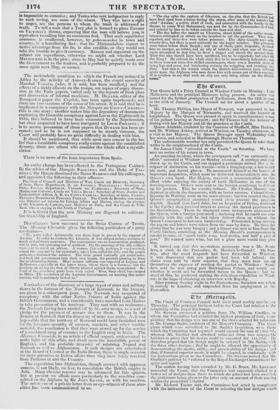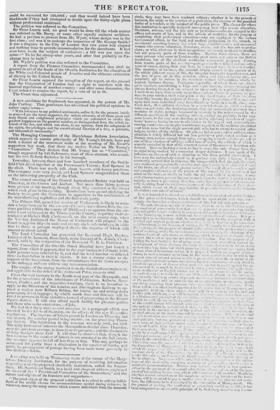J3c ftletropolis.
The Court of Common Council held tht-ir usual weekly meeting on Thursday. The principal business before the Court had relation to the rebuilding of the itoyal Exchange. Mr. Stevens presented a petition from Mr. William Grellier, to whom the Committee had awarded the highest premium of 3001., com- plaining that his design was not one of the three selected for reference to Mr. George Smith, architect of the Mercer's Company. The three plans which were submitted to Mr. Smith's im,pection, Wore those hich the Committee had reported would exceed the stun of no,e,)0/., whereas Mr. Grellier had obtained estimates from two respeetAle builders to prove that his design could be executed for 144,7so/. I fa therefore prayed that his design might be referred to Mr. Smith, ,.,•ith the three other designs ; that he might be allowed the opportuni!y ef demonstrating the merits, utility, and practicability of his design ; and that, if found of superior merit, it might be adopted, in conformity with tile instructions given to the Committee. Mr. Stevens moved that Mr. Grellier's petition be "referred to the Royal Exchange Committee to in- quire and report." The motion having been seconded by Mr. C. Brace, Mr. Lawrowe reminded the Court, that the Committee had expressly alluded to a better set of designs than those to which the prizes had been awar led, the preference being given to the latter only on account of their coming within the prescribed 150,000/.
Mr. Richard Taylor said, the Committee had acted in compliance with the instructions of the Court in selecting the best designs which could be executed for 150,000L; and they would indeed have been blockheads if they had attempted to decide upon the thirty-eight plans without professional assistance.
The petition was referred to the Committee.
Sir Peter Laurie said, no good would be done till the whole matter was referred to Mr. Barry, or some other equally eminent architect. He had a petition to present from Mr. Wyatt, whose design was in the first class ; and was it to undergo the inspection of Mr. George Smith ? It was a disgrace to the City of London that two years had elapsed and nothing done to provide accommodation for the merchants. It had even been made the subject of caricature : a bill was put upon the ruins—" 'I'o let for ninety-nine years, and after that probably an Ex- change may be built."
Mr. Wyatt's petition was also referred to the Committee.
A report from the Finance Committee recommended that 2001. be granted in aid of the funds of the Oberlin Institution for the education of the White and Coloured people of America and the ultimate extinction of slavery in the United States.
Sir Peter Laurie opposed the reception of the report, on the ground that the Corporation of London had no right to interfere with the internal regulations of another country : and after some discussion, the Court refused to receive the report, by a vote of 42 to 38. The Court then adjourned.



























 Previous page
Previous page